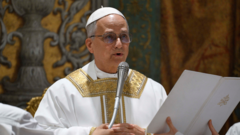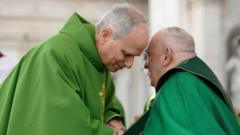The Vatican conclave, which began following the death of Pope Francis, saw black smoke rising after the first vote among the 133 cardinals, indicating a lack of consensus. The cardinals will reconvene Thursday for further voting amid a divided church.
Vatican Conclave Fails to Elect Pope in Initial Vote

Vatican Conclave Fails to Elect Pope in Initial Vote
Black smoke signals indicate that the Cardinals at the Vatican have not yet reached a consensus for the new pope, setting the stage for continued deliberations on Thursday.
Black smoke billowed from the chimney atop the Sistine Chapel on Wednesday evening, signaling that the conclave of 133 cardinals failed to elect a new pope during their first voting session. As per tradition, the indication of black smoke means the cardinals did not reach the required two-thirds majority in their initial ballots, and the voting process will proceed tomorrow morning.
The conclave commenced following the death of Pope Francis just over two weeks ago, marking the first papal election in over a decade. Despite expectations that the initial vote might not yield a pope, spectators in St. Peter’s Square expressed disappointment as the long-awaited smoke signal confirmed the need for additional scrutiny amongst the cardinals.
As the cardinals retreated to guest accommodations within the Vatican, they will remain secluded without any outside communication, continuing their deliberations under vows of secrecy until an agreement is reached. This election is particularly noteworthy as many cardinals appointed by Pope Francis gather for the first time, leaving the future direction of the church unsettled amidst ideological divides.
The gathering of cardinals, all male and predominantly older than 50, began following a solemn Mass at St. Peter’s Basilica. The rituals of the papal election, held within the iconic Sistine Chapel, feature meticulous procedures to deter any external interference. Voting was expected to continue throughout Thursday with four rounds planned for the day.
With the political climate surrounding the Catholic Church straddling between progressive and conservative factions, the upcoming votes are critical to determining whether the tradition of openness and inclusion championed by Francis will carry forward or if a more conservative approach will be adopted.
Following this first round of ballots, the next vote is anticipated around 10:30 a.m. local time on Thursday, with additional rounds scheduled intermittently until either a consensus is reached or the cardinals decide to take a break on Sunday for prayer should no pope be elected by Saturday evening.
As the world reflects on the process underway in Vatican City, many are closely monitoring the outcomes, acknowledging that the direction chosen in this conclave will likely redefine the future of the Catholic Church globally.
The conclave commenced following the death of Pope Francis just over two weeks ago, marking the first papal election in over a decade. Despite expectations that the initial vote might not yield a pope, spectators in St. Peter’s Square expressed disappointment as the long-awaited smoke signal confirmed the need for additional scrutiny amongst the cardinals.
As the cardinals retreated to guest accommodations within the Vatican, they will remain secluded without any outside communication, continuing their deliberations under vows of secrecy until an agreement is reached. This election is particularly noteworthy as many cardinals appointed by Pope Francis gather for the first time, leaving the future direction of the church unsettled amidst ideological divides.
The gathering of cardinals, all male and predominantly older than 50, began following a solemn Mass at St. Peter’s Basilica. The rituals of the papal election, held within the iconic Sistine Chapel, feature meticulous procedures to deter any external interference. Voting was expected to continue throughout Thursday with four rounds planned for the day.
With the political climate surrounding the Catholic Church straddling between progressive and conservative factions, the upcoming votes are critical to determining whether the tradition of openness and inclusion championed by Francis will carry forward or if a more conservative approach will be adopted.
Following this first round of ballots, the next vote is anticipated around 10:30 a.m. local time on Thursday, with additional rounds scheduled intermittently until either a consensus is reached or the cardinals decide to take a break on Sunday for prayer should no pope be elected by Saturday evening.
As the world reflects on the process underway in Vatican City, many are closely monitoring the outcomes, acknowledging that the direction chosen in this conclave will likely redefine the future of the Catholic Church globally.




















